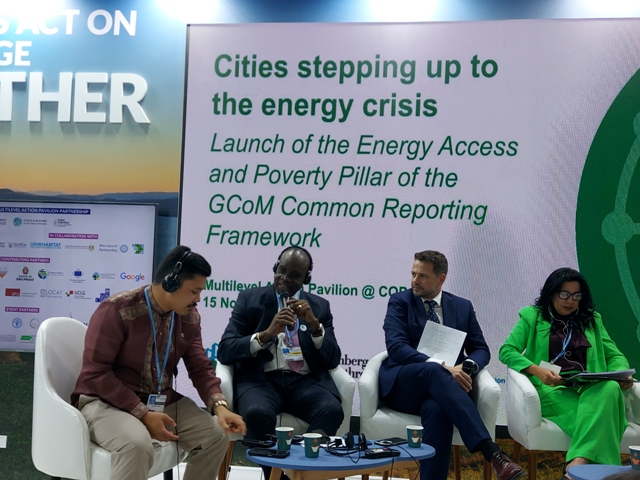 Session during COP27 in Sharm El-Sheikh, Egypt. [photo: Carl Wright]
Session during COP27 in Sharm El-Sheikh, Egypt. [photo: Carl Wright]
COP27 had some 33,000 participants including officials from international organisations, government negotiators, climate change activists, indigenous peoples’ representatives, local mayors, academics, business lobbyists and many more.
Apart from the initial meetings of Heads of Government and subsequent formal negotiations, some of which our team was able to observe, the COP had specific themes for different days – Finance, Science/Youth and Future Generations/Resilience, Decarbonisation/Industry, Adaptation/ Agriculture/Food Systems/land, Gender/Water, Civil Society & Action for Climate Empowerment/Energy, Biodiversity/Ocean & Coastal Zones/Transport and Solutions/Human Settlements.
Commonwealth reactions to COP27
Climate Change – Challenges, Issues and Commonwealth Responses A special 2021 edition of The Round Table Journal
In assessing the COP27 outcomes it is clear that it did not achieve progress on COP26 in accelerating the move to secure the key goal of 1.5c and this is deeply unsatisfactory. According to the Nationally Determined Contributions (NDCs) pledged, global temperatures are still set to arise by well over 2.0c (even assuming all NDC commitments are met); a proposal to commit to have emissions peak by 2025 was not adopted. Likewise, there was no progress on commitments to phase out all fossil fuels, which had been hoped for, and a vague -and potentially counter-productive- reference to boosting ‘low emissions energy’ which countries with newly discovered fossil fuel reserves, including from Africa, are interpreting as embracing gas (which has lower emissions than coal).
One important success, based on an EU initiative, was agreement to establish a ‘loss and damage’ fund to compensate developing countries to pay for climate-related damage. However, neither the modalities of the fund nor its size has yet been agreed and as the UN Secretary-General has stated, such a fund will be of little avail if whole islands disappear below the waves and much of Africa turns into a desert if global warming cannot be contained.
More detailed COP outcomes included:
- High-Level Expert Group on the Net Zero Emissions Commitments of Non-State Entities (with focus on greenwashing practices by private sector)
- Executive Action Plan for the early Warnings for All Initiative (calls for $3.1 billion 2023-2027 to set up global early warning system for climate disasters)
- New independent inventory of greenhouse gas emissions (by Climate TRACE Coalition)
- Master Plan to accelerate decarbonisation (power, road transport, steel, hydrogen, agriculture)
- Food and Agricultural for Sustainable Transformation Initiative (FAST to improve finance to transform agriculture and food systems by 2030)
- Sharm El-Sheikh Adaptation Agenda
- Action on Water Adaptation & Resilience (AWARe)
- African Carbon Market Initiative
- Insurance Adaptation Acceleration Campaign
- Global Renewables Alliance
- First Movers Coalition (FMC; cement & concrete commitment)
- Sustainable Urban Resilience for the next Generation (SURGe – buildings & housing, urban energy, urban waste and consumption, urban mobility, urban water)
Above all, it was apparent that despite the disappointing progress made by government negotiators and shown in NDC commitments, a great deal of real practical climate action was taking place at the local community level, not least the many mitigation and adaptation measures being pursued by mayors and local governments (with cities accounting for the bulk of greenhouse gas emissions). In addition, many of those present highlighted action to ensure Just Transition and address the needs of less well-off sections of the population. This means that if real progress is made at grassroots level, there remains hope that climate targets could be met.
It further needs recalling that COP27 was taking place in the context of the impact of the Ukraine War and the spiralling energy costs and saw attempts by certain countries to water down the Glasgow commitments which was thankfully prevented.
Carl Wright of a member of the Round Table editorial board and Secretary-General emeritus of the Commonwealth Local Government Forum.
Related articles:
“Unexpected good practices”: Thoughts from COP27
Did “Africa’s COP” meet expectations?



